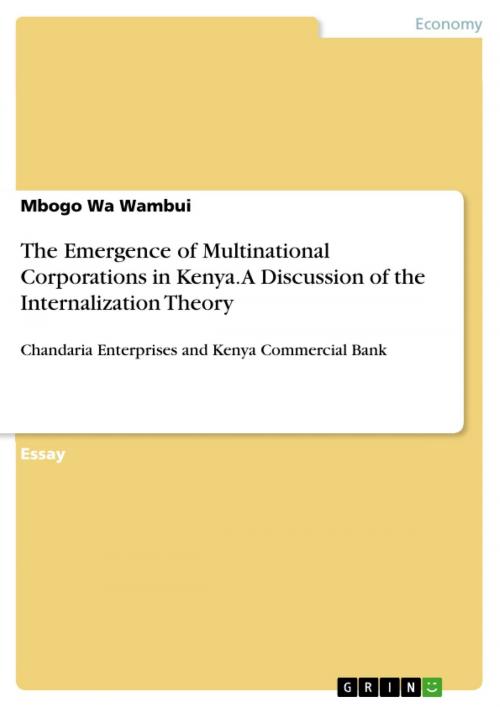The Emergence of Multinational Corporations in Kenya. A Discussion of the Internalization Theory
Chandaria Enterprises and Kenya Commercial Bank
Business & Finance, Economics, International| Author: | Mbogo Wa Wambui | ISBN: | 9783668217560 |
| Publisher: | GRIN Verlag | Publication: | May 13, 2016 |
| Imprint: | GRIN Verlag | Language: | English |
| Author: | Mbogo Wa Wambui |
| ISBN: | 9783668217560 |
| Publisher: | GRIN Verlag |
| Publication: | May 13, 2016 |
| Imprint: | GRIN Verlag |
| Language: | English |
Essay from the year 2011 in the subject Economics - International Economic Relations, grade: 18/30, University of Nairobi, course: Political Economy, language: English, abstract: The paper is an evaluation of the influence of multinational corporations in Kenya and evaluates whether or not they have benefited Kenyan citizens. Many theories have been advanced in explaining the origin, development and motivation of multinational corporations' investments globally. Multinational corporations (MNCs) are motivated by factors either internal to the investment or external to the location. The determinant of expansion of these firms may mean there is need to produce and sell goods and/or services in a number of countries. This is either through exports or through direct investment in these countries. But first of all, what is a multinational corporation? A multinational company or business has offices, shops or factories in several countries. Multinational corporations are business corporations based in one particular country as the mother country with subsidiaries in other countries. They may also be defined in the context of the expertise and the origin of staff. They qualify as so if the extent of their staff establishment reflects a global representation both locally and internationally in their subsidiaries. This paper seeks to discuss the Internalization Theory in explaining the emergence of multinational corporations in a developing country-in our case, Kenya. Based on her experience, we shall discuss the import of the Internalization Theory in understanding the emergence of at least 2 multinational corporations.
Essay from the year 2011 in the subject Economics - International Economic Relations, grade: 18/30, University of Nairobi, course: Political Economy, language: English, abstract: The paper is an evaluation of the influence of multinational corporations in Kenya and evaluates whether or not they have benefited Kenyan citizens. Many theories have been advanced in explaining the origin, development and motivation of multinational corporations' investments globally. Multinational corporations (MNCs) are motivated by factors either internal to the investment or external to the location. The determinant of expansion of these firms may mean there is need to produce and sell goods and/or services in a number of countries. This is either through exports or through direct investment in these countries. But first of all, what is a multinational corporation? A multinational company or business has offices, shops or factories in several countries. Multinational corporations are business corporations based in one particular country as the mother country with subsidiaries in other countries. They may also be defined in the context of the expertise and the origin of staff. They qualify as so if the extent of their staff establishment reflects a global representation both locally and internationally in their subsidiaries. This paper seeks to discuss the Internalization Theory in explaining the emergence of multinational corporations in a developing country-in our case, Kenya. Based on her experience, we shall discuss the import of the Internalization Theory in understanding the emergence of at least 2 multinational corporations.















